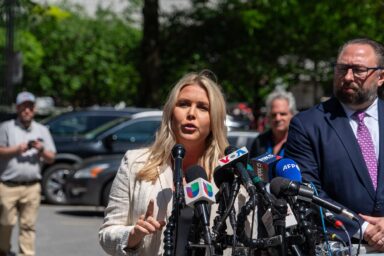How withholding information on would-be assassin John Hinckley Jr. harms the public interest and public trust.
|
Listen To This Story
|
The strange shooting of Donald Trump remains a mystery, but presidential assassins, and would-be assassins in general, have as a result gotten renewed attention from the media.
Unfortunately, this new coverage suffers from the same egregious flaws as earlier media stories about these history-shaking events. So, even before I began reading a recent New York Times Magazine article about John Hinckley Jr., who almost assassinated Ronald Reagan, I felt a sense of dread.
I knew before I read it almost exactly what it would say — that it would be a platform for platitudes and falsehoods perpetuated for more than half a century, and that the single most interesting thing about Hinckley and his shooting of Reagan would never be mentioned. But I plunged in.
The mere fact that major media like The New York Times and their contributors instinctively play this game of Hide the Object worries me deeply, largely because much of what they report is true — creating the false impression that all of what they report is true and complete.
From what they write, you would never guess that there might conceivably be more to acts of domestic political violence than a random sad delusional character — like Hinckley — acting out some self-generated sick fantasy.
For example: You would never have guessed that the psychiatric hospital where Hinckley was placed after the shooting had been historically involved in the CIA’s MK-ULTRA program with its mind control experiments focused on “programming” killers. And that while George Bush Sr. was director of the CIA — he presided over suppressing the truth about this program.
Nor would you have guessed that Bush was also a personal friend of the Hinckleys (like Bush, Hinckley Sr. was a Texas oil executive), and would surely have known about the son’s problems — and that he was in that particular hospital. Had Hinckley succeeded in killing Reagan, Bush would not have waited eight long years in the shadows before becoming president. (The Bush and Hinckley families were so close that Hinckley Jr.’s brother Scott and his date were to dine with Neil Bush the night after the shooting, but the dinner was canceled after the shooting.)

None of the above proves Hinckley shot Reagan because he had been programmed to do so, or that Bush had anything whatsoever to do with it — but why does the media tell you none of these fascinating facts? (And, of the 808 documents the FBI released on Hinckley, why did they delete 22 of them which dealt with Hinckley’s associates?)
In their reporting on presidential assassinations and near-assassinations, the media typically omit all such red-flag evidence of alternative explanations — no matter how compelling. In some cases, they even omit mention of any absence of evidence needed to support the acceptable narrative. They omit all significant inconsistencies. And yet they state their conclusions with inappropriate certainty. Case closed.
Eventually, over the years, some of that suppressed evidence has made its way to the surface. Reports of official documents still being withheld — and, perhaps even more disturbing, reports on the destruction of vital evidence — have crept into the corporate media.
And now, instead of believing everything said by the media, a large percentage of the American public believes nothing of what they say. This is highly destructive to our trust in the media — and destructive to our democracy.
It’s why I started WhoWhatWhy: to make available a place where serious people could seriously discuss whatever transpires. A place where all these odd things like the shooting of Trump could be honestly explored and every possibility investigated.
I fully understand why the corporate media (and many nonprofit news sites as well) keep up the fantasy that every single would-be or actual presidential assassin acted alone. And that the same media figures effectively deny that powerful interests with a major stake in who rules the nation could have planned and carried out the kind of history-altering actions that people outside the US have no trouble accepting as possible and even, in some circumstances, likely interventions in the normal course of political contention
But despite these attempts to ignore or, in some cases, suppress such speculation, as mentioned above, more and more evidence has been made available to the public, and highly respectable figures have come forward to offer their own knowledge and analysis that contradicts the official stories relating to the deaths of John F. Kennedy, Robert Kennedy, Martin Luther King Jr., and others.
Even a House Committee on the JFK murder concluded in a 1979 report that it found indications of conspiracy. Not that you’d know it, decades later, reading our “most trusted” media.
Because of the need to maintain an open mind and not muffle legitimate inquiry — as the Times, The Washington Post, and 99 percent of all American media have effectively done when it comes to high-profile assassinations and near-assassinations — I share with you a short article I wrote on John Hinckley Jr. some years ago.
I make no claims that the connections and factors that I cite prove a specific alternative to the official story. But my own findings in researching for my book Family of Secrets stunned me, and made me realize that we’re living in a kind of naiveté bubble. I believe we owe it to the public to go in with open minds, investigate fairly — and to reveal germane, often startling information.
Please see my previous story for more detail:
Bush Angle to Reagan Shooting Still Unresolved as Hinckley Walks – WhoWhatWhy




